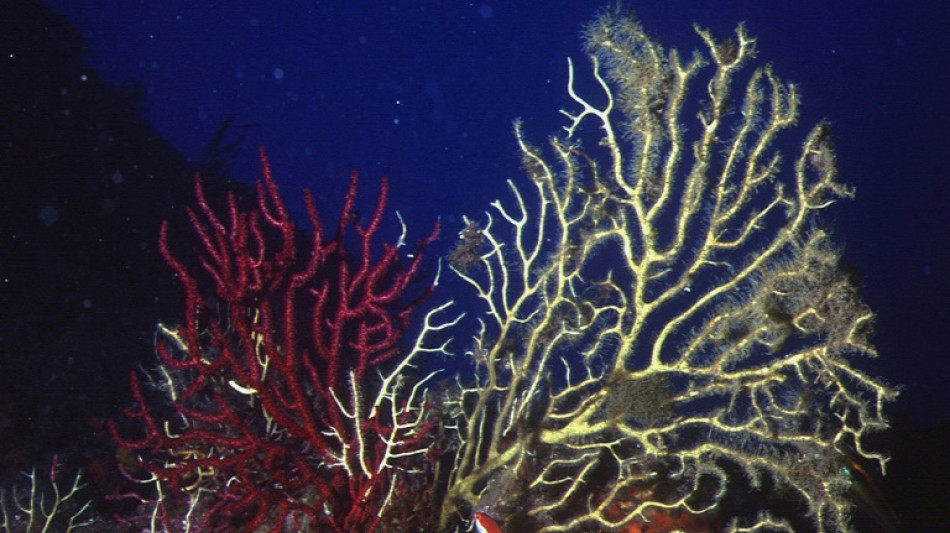
-
 'One isn't born a saint': School nuns remember Pope Francis as a boy
'One isn't born a saint': School nuns remember Pope Francis as a boy
-
Battling Forest see off Spurs to boost Champions League hopes

-
 'I don't miss tennis' says Nadal
'I don't miss tennis' says Nadal
-
Biles 'not so sure' about competing at Los Angeles Olympics

-
 Gang-ravaged Haiti nearing 'point of no return', UN warns
Gang-ravaged Haiti nearing 'point of no return', UN warns
-
US assets slump again as Trump sharpens attack on Fed chief

-
 Forest see off Spurs to boost Champions League hopes
Forest see off Spurs to boost Champions League hopes
-
Trump says Pope Francis 'loved the world,' will attend funeral
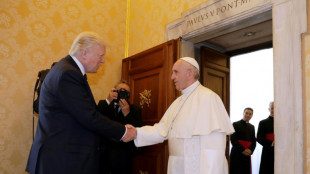
-
 Oscar voters required to view all films before casting ballots
Oscar voters required to view all films before casting ballots
-
Bucks' Lillard upgraded to 'questionable' for game 2 v Pacers

-
 Duplantis and Biles win Laureus World Sports Awards
Duplantis and Biles win Laureus World Sports Awards
-
US urges curb of Google's search dominance as AI looms

-
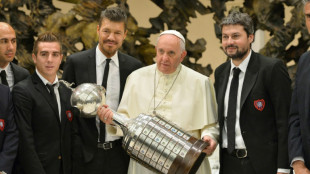 The Pope with 'two left feet' who loved the 'beautiful game'
The Pope with 'two left feet' who loved the 'beautiful game'
-
With Pope Francis death, Trump loses top moral critic
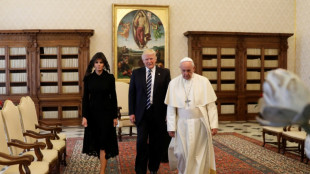
-
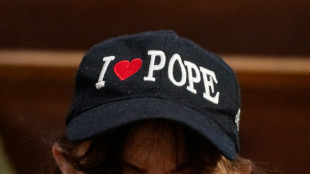 Mourning Americans contrast Trump approach to late Pope Francis
Mourning Americans contrast Trump approach to late Pope Francis
-
Leeds and Burnley promoted to Premier League

-
 Racist gunman jailed for life over US supermarket massacre
Racist gunman jailed for life over US supermarket massacre
-
Trump backs Pentagon chief despite new Signal chat scandal

-
 Macron vows to step up reconstruction in cyclone-hit Mayotte
Macron vows to step up reconstruction in cyclone-hit Mayotte
-
Gill, Sudharsan help toppers Gujarat boss Kolkata in IPL

-
 Messi, San Lorenzo bid farewell to football fan Pope Francis
Messi, San Lorenzo bid farewell to football fan Pope Francis
-
Leeds on brink of Premier League promotion after smashing Stoke

-
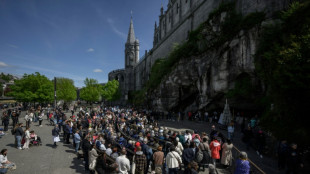 In Lourdes, Catholic pilgrims mourn the 'pope of the poor'
In Lourdes, Catholic pilgrims mourn the 'pope of the poor'
-
Korir wins men's Boston Marathon, Lokedi upstages Obiri

-
 China's CATL launches new EV sodium battery
China's CATL launches new EV sodium battery
-
Korir wins Boston Marathon, Lokedi upstages Obiri

-
 Francis, a pope for the internet age
Francis, a pope for the internet age
-
Iraq's top Shiite cleric says Pope Francis sought peace
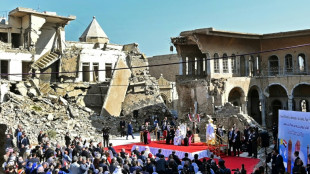
-
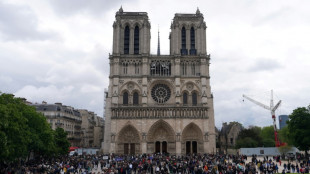 Mourners flock to world's churches to grieve Pope Francis
Mourners flock to world's churches to grieve Pope Francis
-
Trump says Pope Francis 'loved the world'
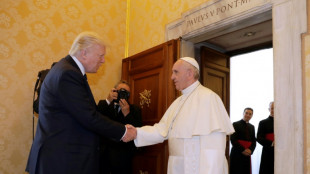
-
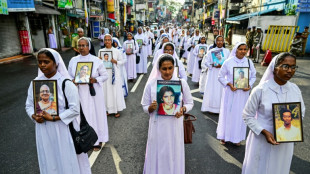 Sri Lanka recalls Pope Francis' compassion on Easter bombing anniversary
Sri Lanka recalls Pope Francis' compassion on Easter bombing anniversary
-
Pope Francis inspired IOC president Bach to create refugee team

-
 Alexander-Arnold will be remembered for 'good things' at Liverpool: Van Dijk
Alexander-Arnold will be remembered for 'good things' at Liverpool: Van Dijk
-
US VP Vance meets Indian PM Modi for tough talks on trade

-
 Pentagon chief dismisses reports he shared military info with wife
Pentagon chief dismisses reports he shared military info with wife
-
15 potential successors to Pope Francis
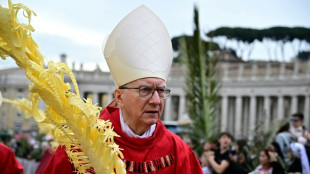
-
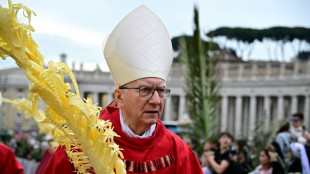 The papabili - 15 potential successors to Pope Francis
The papabili - 15 potential successors to Pope Francis
-
Zhao sets up all-China clash after beating 2024 world snooker finalist Jones

-
 Ostapenko stuns Sabalenka to win Stuttgart title
Ostapenko stuns Sabalenka to win Stuttgart title
-
Argentina mourns loss of papal son
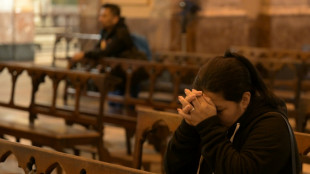
-
 African leaders praise Pope Francis's 'legacy of compassion'
African leaders praise Pope Francis's 'legacy of compassion'
-
Mehidy's five wickets help Bangladesh fight back in first Zimbabwe Test

-
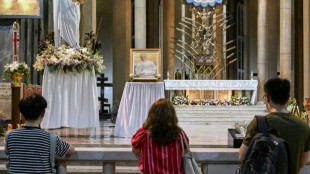 'The voice of god': Filipinos wrestle with death of Pope Francis
'The voice of god': Filipinos wrestle with death of Pope Francis
-
Prayers, disbelief in East Timor after Pope Francis death
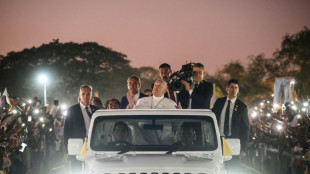
-
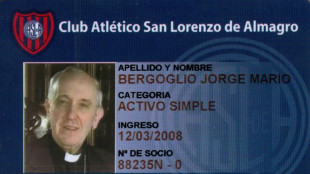 Real Madrid hold minute's silence as La Liga mourns Pope Francis
Real Madrid hold minute's silence as La Liga mourns Pope Francis
-
World leaders pay tribute to Pope Francis, dead at 88

-
 World leaders react to the death of Pope Francis
World leaders react to the death of Pope Francis
-
Zimbabwe lead first Test despite Bangladesh spinner Mehidy's five wickets

-
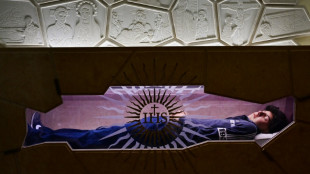 Vatican postpones sainthood for 'God's influencer' after pope's death
Vatican postpones sainthood for 'God's influencer' after pope's death
-
Pope's death prompts CONI to call for sporting postponements, minute's silence


Underwater heat 'inferno' ravages Mediterranean corals
In the temperate shallows of the Mediterranean, once-vibrant red and purple coral forests that provide a crucial haven for biodiversity now stand bleached and brittle, transformed into skeletons by record summer temperatures, scientists say.
Holding naked branches of gorgonian coral, Tristan Estaque of marine conservation group Septentrion Environnement is returning despondent from an exploratory dive off the coast of Marseille in southern France.
"It is heartbreaking, the deterioration is so fast," he tells AFP.
Dive surveys just two months earlier found an intact landscape, lush with violet-fringed fans of gorgonian coral.
Now it is a "ghost forest", says Estaque, with the majestic fans largely bare of living tissue.
"You have to imagine a tree where there are no more leaves, no more bark."
- Fragile forests -
Gorgonian corals, which have flexible skeletons encrusted with polyps, are found across the planet.
Those found in the Mediterranean are said to create "forests", sheltering a huge array of species.
But they are acutely vulnerable to human activities.
Fishing nets, anchors and careless divers can rip their delicate structures, while exposure to continuous and intense heat can be lethal.
Marine heatwaves are becoming more common, according to a report this year by UN climate experts.
This summer a major marine heatwave hit the western Mediterranean, with water up to five degrees Celsius (41 degrees Fahrenheit) hotter than normal, according to Mercator Ocean International, the organisation that runs the European ocean monitoring service.
In some places water reached 30C.
Recent Septentrion Environnement surveys have shown that between 70 and 90 percent of the red gorgonian population in the 10 to 20-metre zone off Marseille have since died.
The effect was like "an underwater inferno", according to Solene Basthard-Bogain, another of the group's specialists.
And it is not just near the southern French coast.
Gorgonian mortality has also been observed on the Spanish coasts and around the Italian island of Sardinia, according to Stephane Sartoretto of the French research agency Ifremer.
The severity of the impact appears to vary depending on the depth of the corals.
Along the sawtooth coastline of France's Calanques National Park, notched with craggy coves and shallow habitats where the gorgonians are found in waters of just six metres (20 feet) in places, the die-offs have been particularly intense.
In the Balearic Islands, they live deeper, at 40 metres, and were therefore less impacted, Sartoretto says.
- 'Forest fire' -
In addition to the gorgonians, sponges and bivalves have also been affected.
The marine heatwave likewise battered mussel farming, with 150 tonnes of commercial mussels and 1,000 tonnes of young stock -- for next year's crop -- lost in Spain over the summer.
A drop in temperatures in the Mediterranean could help to save those corals that were spared in the summer die-off, says Basthard-Bogain, although she worries that any pathogens that may have spread because of the heat would still be present in the waters.
There are fears, too, that another hot spell cannot be ruled out before the end of the autumn.
Sartoretto says he worries that repeated periods of heat stress could be devastating for the corals.
"We can ask ourselves about the possibility of their disappearance," he says, adding that their reproduction rate is very slow.
"Like after a forest fire on land," he says, "they will take decades to regenerate."
I.Meyer--BTB



